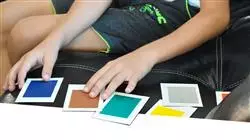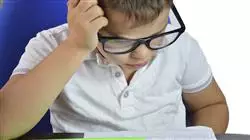University certificate
The world's largest faculty of psychology”
Why study at TECH?
With this Postgraduate diploma, you will enter the 2030 horizon of the psychoeducational field, in which the school psychologist will develop"

The role of educational psychologists is key to school coexistence and a healthy educational environment. The figure of an educational counselor is increasingly necessary, which unfortunately in previous years has been developed by non-specialized professionals. It is essential to know the keys to action and protocols in the face of pathologies related to LD in order to develop a correct psychological praxis. In this sense, specialists must have innovative tools that integrate technologies, but also emotional techniques that connect the professional with the students in order to detect and anticipate problems in the educational and personal environment of those affected.
TECH has designed this Postgraduate diploma in Diagnosis, Multidisciplinary Approach and Intervention Programs in LD for graduates in Psychology who wish to deepen their knowledge in the area of educational guidance, intervention against Learning Difficulties, psychoeducational reports and the universal design of education. To achieve this, the program explores the multidisciplinary approach to LD and the neurological bases involved in these pathologies, among other issues. All this, to expand and update the knowledge of psychologists, through strategic tools.
This is a university program taught in a 100% online format, which allows students to digitally enter into information and communication technologies and their application to the profession of educational psychologist in a comprehensive manner. All this, thanks to theoretical-practical and additional materials that students will have at all times and that will make the study a flexible and dynamic process. In addition, the innovative educational system, based on Relearning methodology, will exempt specialists from long hours of memorization and will allow them to adapt the pace of study according to their personal and professional needs.
A program that addresses education in special centers and the role of the psychologist in its educational guidance functions"
This Postgraduate diploma in Diagnosis, Multidisciplinary Approach and Intervention Programs in LD contains the most complete and up-to-date program on the market. The most important features include:
- The development of case studies presented by experts in psychology and education
- The graphic, schematic, and practical contents with which they are created, provide scientific and practical information on the disciplines that are essential for professional practice
- Practical exercises where self-assessment can be used to improve learning
- Its special emphasis on innovative methodologies
- Theoretical lessons, questions to the expert, debate forums on controversial topics, and individual reflection assignments
- Content that is accessible from any fixed or portable device with an Internet connection
Get all the tools you need to understand psychological disorders and apply novel techniques for recovery in the learning environment"
The program’s teaching staff includes professionals from sector who contribute their work experience to this educational program, as well as renowned specialists from leading societies and prestigious universities.
The multimedia content, developed with the latest educational technology, will provide the professional with situated and contextual learning, i.e., a simulated environment that will provide immersive education programmed to learn in real situations.
This program is designed around Problem-Based Learning, whereby the professional must try to solve the different professional practice situations that arise during the academic year. For this purpose, the student will be assisted by an innovative interactive video system created by renowned and experienced experts.
Deepen your knowledge of the trends in the care of LD in non-formal psycho-educational centers to become a more competent specialist in this field"

Designs educational programs that focus on inclusion and the detection of specific attention needs in the classroom"
Syllabus
The Postgraduate diploma in Diagnosis, Multidisciplinary Approach and Intervention Programs in LD is an innovative program that is taught through a 100% online mode to make it possible to study in a flexible way. TECH offers a complete and rigorous degree focused on LD intervention programs, educational taxonomies and instructional design of psychoeducational programs, universal teaching and multidisciplinary approach to LD, among other aspects. In addition, this program is developed in 6 academic months and in an exhaustive manner, through downloadable didactic contents, so that specialists can have them at their disposal at any time and place.

Update your knowledge in diagnosis of LD associated with language and be part of the psychoeducational vanguard that is at the forefront of current education”
Module 1. Differential Diagnosis and Multidisciplinary Approach to LD
1.1. LD and Language
1.1.1. Language-Associated LD Diagnosis
1.1.2. Comorbidity with other Disorders
1.1.3. Differentiating LD and Language Factors
1.1.4. Multidisciplinary Intervention in Language Disorders
1.2. LD and ADHD
1.2.1. Neurological Basis in ADHD and Learning Disabilities
1.2.2. Differential Diagnosis and Comorbidity
1.2.3. Multidisciplinary Intervention in LD and ADHD
1.3. LD and Visual Impairment
1.3.1. LD and Visual Impairment Educational Needs Due to Visual Impairment
1.3.2. Integration Factors and Agents
1.3.3. Multidisciplinary Intervention
1.4. LD and Motor Disability
1.4.1. LD Diagnosis Associated with Motor Disability
1.4.2. Specific Adaptations for Students with LD and Motor Disability
1.4.3. Multidisciplinary Intervention in LD and Motor Disability
1.5. LD and Intellectual Disability
1.5.1. LD Conceptualization and Intellectual Disability
1.5.1.1. Differential Diagnosis of Intellectual Disability
1.5.1.2. Multidisciplinary Intervention in LD and Intellectual Disability
1.6. LD and Psychological Disorders
1.6.1. Learning Difficulties and Socio-Affective Disorders
1.6.1.1. Learning Difficulties and Sociocultural Disorders
1.6.1.2. Learning Difficulties and Behavioral Disorders
1.7. Hospitalization and Learning Disabilities
1.7.1. Learning and Hospitalization
1.7.2. Psycho-Educational Care in the Hospital Context
1.7.3. Therapeutic Intervention in the Hospital Context
1.8. Multidisciplinary Approach: LD and Psychopedagogy
1.8.1. Psychopedagogical Approaches to LD
1.8.2. Psychopedagogical Intervention in Reading LD
1.8.3. Psychopedagogical Intervention in Writing LD
1.8.4. Psychopedagogical Intervention in Math LD
1.9. Multidisciplinary Approach: LD and School
1.9.1. Educational Reinforcement and Learning Difficulties
1.9.2. Hearing and Language Field Intervention
1.9.3. Therapeutic Pedagogy Intervention
1.10. Distinction between Learning Difficulties (LD) and Specific Learning Difficulties (SpLD)
1.10.1. Conceptualization and Differentiation between LD and SpLD
1.10.2. LD and SpLD Classification
1.10.3. LD and SpLD Multidisciplinary Intervention
Module 2. Educational Taxonomies, Instructional Design of Psycho-Educational Programs, Psycho-Educational Reports and Universal Design for All
2.1. The Teaching-Learning Environment
2.1.1. Learning Environment, Agents and Model Definition
2.1.2. Instructional Design Concept
2.1.3. Instructional Procedure Definition
2.2. Instructional Design Phases
2.2.1. Instructional Design Types
2.2.2. Instructional Design Phases
2.2.3. Instructional Design in the Online Environment
2.3. Instructional Functions
2.3.1. Proper Instructional Functions
2.3.2. Instrumental Functions
2.3.3. Special Functions
2.4. Efficiency-Based Educational Taxonomies
2.4.1. Goal Theory Value in School Efficiency and Achievement
2.4.2. Bloom's Taxonomy
2.4.3. Gagné’s and Briggs’ Taxonomy
2.4.4. Component Manifestation Theory
2.5. Inclusive Education Principles and Specific Classroom Special Needs Detection
2.5.1. Inclusive Education and its Principles
2.5.2. Inclusive Education and Attention to Diversity
2.5.3. Practical Examples of Inclusive Education and Universal Design
2.6. Introduction to Psychopedagogical Report Creation and Drafting
2.6.1. Concept: Psychopedagogical Design
2.6.2. Intervention Proposal Selection Criteria
2.6.3. Activity Development Recommendations
2.6.4. OLPPD Regulations and Current Psychopedagogical Reports
2.7. What is Curricular Adaptation? Curricular Adaptation Proposals and Design
2.7.1. Curricular Adaptation and Psychoeducational Reports
2.7.2. Curricular Adaptation Types in Compulsory Education Schools
2.7.3. Curricular Adaptation Design
2.8. Current Trends in Educational Psychology and LDs
2.8.1. Assessment and Intervention in LD Today
2.8.2. Specific Collaboration and Social Association Centers: Social Support Networks
2.8.3. New Technology and LDs
2.9. Psycho-Educational Program Design, Methodology and Evaluation
2.9.1. Psychoeducational Program Concept and Design
2.9.2. Program Results Evaluation
2.9.3. Key Psycho-Educational Programs in Learning Difficulties
2.10. Individualized Educational Program
2.10.1. Theoretical Conceptualization
2.10.2. Parts of an IEP
2.10.3. IEP Development and Evaluation
Module 3. Learning Difficulties Intervention
3.1. Conceptualisation: LD Intervention
3.1.1. Cognitive-Behavioral Intervention
3.1.2. Intervention from a Systemic Approach
3.1.3. LD Intervention Levels
3.2. Early LD Intervention and Attention
3.2.1. Early LD Intervention Models
3.2.2. LD Prevention
3.2.3. Early LD Attention
3.3. LD Attention in Schools and in Multidisciplinary Teams and in Non-Formal Socio-Educational Centers
3.3.1. Attention Process to LD in Schools
3.3.2. Educational Agents in AD Attention
3.3.3. Intervention in Non-Formal Psycho-Educational Centers
3.4. Reading Intervention Program Development
3.4.1. Conceptualization
3.4.2. Intervention Program Design
3.4.3. Intervention Program Examples
3.5. Writing Intervention Program Development
3.5.1. Conceptualization
3.5.2. Intervention Program Design
3.5.3. Intervention Program Examples
3.6. Intervention Program Development in Attention and Perception
3.6.1. Conceptualization
3.6.2. Intervention Program Design
3.6.3. Intervention Program Examples
3.7. Memory Intervention Program Development
3.7.1. Conceptualization
3.7.2. Intervention Program Design
3.7.3. Intervention Program Examples
3.8. Intervention Program Development with Technological Resources
3.8.1. Technological Resources and Psycho-Educational Intervention
3.8.2. LD and Technology Resources
3.8.3. Available Resources Examples
3.9. LD in Adult and Post-Compulsory Education
3.9.1. LD Assessment and Diagnostics in Adults
3.9.2. LD Intervention Programs for Adults
3.9.3. LD Diagnosis and Intervention in Post-Compulsory Education
Module 4. LD Intervention Programs, Organization and Competencies of Educational Guidance Services in Spain
4.1. Types of LD Intervention Programs According to the Target Population I
4.1.1. Individual Programs
4.1.2. Group Programs
4.1.3. Peer-to-Peer Classroom Programs
4.1.4. Small Group Programs
4.2. Types of LD Intervention Programs According to the Target Population II
4.2.1. Specific Programs in a Single Field
4.2.2. Programs with Transversal Competencies for Life
4.2.3. Cultural Integration Programs
4.2.4. Intellectual Enrichment Programs
4.3. Preparation and Types of Educational Reports
4.3.1. Types of Educational Reports in the Educational Center
4.3.2. Preparation of an Individual Educational Program
4.3.3. Writing Individual Educational Programs (IEPs)
4.4. Ethical and Deontological Aspects in the Issuance of Multidisciplinary Psychopedagogical Reports
4.4.1. The Professional College of Psychology
4.4.2. Ethics in School Counseling Services
4.4.3. The Deontological Criteria of School Psychologists
4.5. Organization and Competencies of Educational Guidance Services in Spain
4.5.1. What is a Special Education Center? Characterization and Operation
4.5.2. Educational Psychologists in Special Education Centers
4.5.3. Special Education Centers and Educational Guidance Services
4.6. Control and Monitoring Elements of the Different Psycho-Educational Agents in the Spanish Education System
4.6.1. Educational guidance teams
4.6.2. Guidance Equipment in Special Education Centers
4.6.3. Guidance Teams in Elementary and Secondary Education
4.6.4. Educational Inspection
4.7. Field of Action and Professional Profile of Educational Psychologists
4.7.1. Historical Framework of Psychologist's Profile in Education
4.7.2. Field of Action of Educational Psychologists
4.8. The Role of School Psychologists
4.8.1. Main Functions and Competencies of School Counselors
4.8.2. School Psychologist Competencies
4.8.3. Regulation of the School Psychology Specialty in Spain
4.9. New Technologies and their Applications in the Psycho-Educational Environment and LDs
4.9.1. Information and Communication Technologies and their Application to Educational Psychologists’ Profession
4.9.2. ICT Applied to LD
4.9.3. Innovative Proposals for Psycho-Educational Assessment and Intervention
4.10. Professional Future in the Psycho-Educational Field of School Psychologists
4.10.1. Horizon 2030, Progress Proposals in the Psycho-Educational Field
4.10.2. Educational Innovation in the Psycho-Educational Field
4.10.3. Job Opportunities for Educational Psychologists in the Near Future

Delve into educational taxonomy and design universal psychoeducational programs to reach all students in the classroom"
Postgraduate Diploma in Diagnosis, Multidisciplinary Approach and Intervention Programs in LD
.
The attention to psychosocial and learning problems in the educational environment is increasingly relevant and has driven the need for highly trained specialists. In this sense, the Postgraduate Diploma in Diagnosis, Multidisciplinary Approach and Intervention Programs in LD, developed by TECH, is presented as an opportunity for those professionals interested in addressing issues such as Bullying or pathologies related to learning difficulties, attention deficit or visual and hearing problems. This program offers rigorous and updated training in educational taxonomies and in the design of universal psychoeducational programs, among other issues, so that professionals acquire the necessary skills to intervene effectively in the different problems that may arise in the educational field. In addition, the 100% online modality and the Relearning methodology allow the study to be flexible and adaptable to the needs of each professional.
Expand your skills in the psychoeducational area
.
With this Postgraduate Diploma, psychologists will be able to update their knowledge and skills in the field of psychological intervention with the child and adolescent population, to address issues such as bullying or learning difficulties. In addition, the program includes a multidisciplinary approach that allows the professional to work in coordination with other specialists, which translates into comprehensive and effective care for the patient. In short, the Postgraduate Diploma in Diagnosis, Multidisciplinary Approach and Intervention Programs in LD is an opportunity for those professionals who wish to specialize in the care of psychosocial and learning problems in the educational environment, and who want to acquire the skills and tools necessary to intervene effectively and multidisciplinary in these issues.







